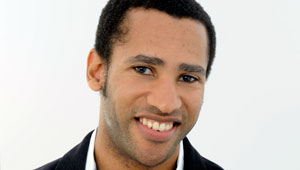Assistant Professor of Chemistry Wilton L. Virgo Publishes Innovative Books on Quantum Mechanics

Students in introductory chemistry often struggle with mastering fundamental mathematical concepts and learning to apply their knowledge to creatively solve problems using critical thinking skills, Wilton Virgo has observed.
Virgo recently published an interactive multi-touch ebook called The Equations of Chemistry. Written for advanced high school and undergraduate students, the ebook aims to get students in the habit of independent analysis and reason in problem solving. The theoretical content is grounded in the real world, and the ebook’s multimodal teaching promotes understanding.
“This book makes connections between fundamental equations and cutting-edge research, like the discovery of the Higgs boson at CERN,” says Virgo. Users can touch and interact with molecules, play animations, and touch to select answers to multiple-choice questions.
In addition to the new ebook, late in 2012 Virgo published Quantum Mechanics in Everyday Life, a print-on-demand book available through The Harvard Bookstore. As the title indicates, the book shows how the math of quantum is the foundation for technology that we use every day. Virgo provides an introduction to the mathematical language that describes the behavior of atoms and molecules, and explains the quantum nature of atomic clocks and compact fluorescent light bulbs, for example, and addresses questions like, among other things, how do lasers work and what role does quantum mechanics play in climate change?
Virgo is a quantum physical chemist with many years’ expertise in performing state-of-the-art research in laser spectroscopy at Princeton University, Brookhaven National Laboratory, Arizona State University, MIT, and Wellesley College. His recent work with student assistants at Wellesley involved research using lasers to drive reactions involving organic molecules in solution; the application of this would be development of a molecular detector for use in early cancer detection.
One of Virgo’s main professional interests is using technology-driven global knowledge systems to collaborate and exchange ideas that solve problems related to climate change at the microscopic level.
Given that atmospheric chemistry is a global issue that affects all life and ecosystems, Virgo says, “The goal of my laboratory research involving state-of-the-art lasers and cutting-edge camera technology is to predict and control the chemistry of climate change that affects the entire biosphere.”
WZLY interviewed Virgo on air about his publications and work this spring. You can hear a recording of the show; tune in at the 1:05.30 mark to hear the interview.
